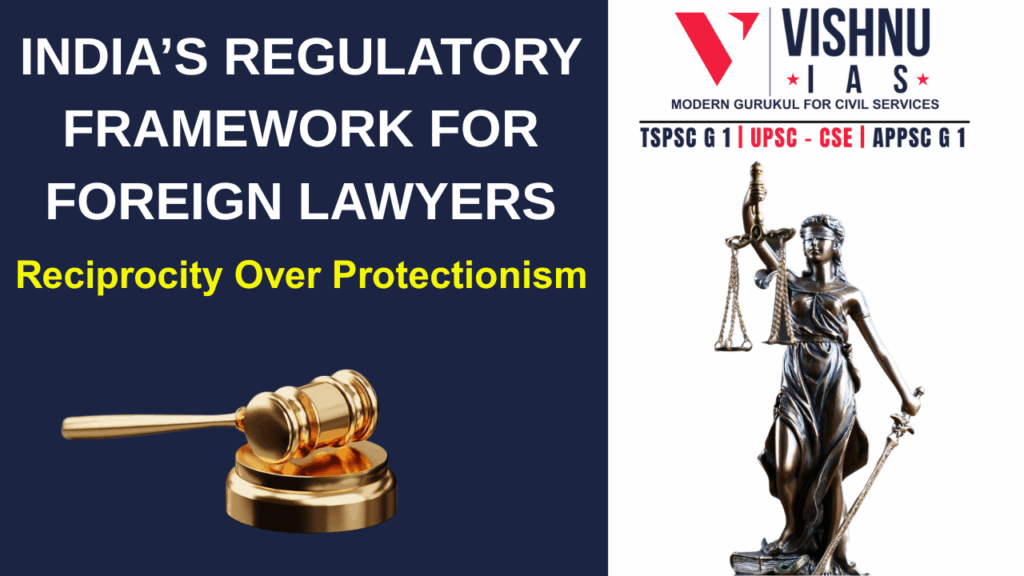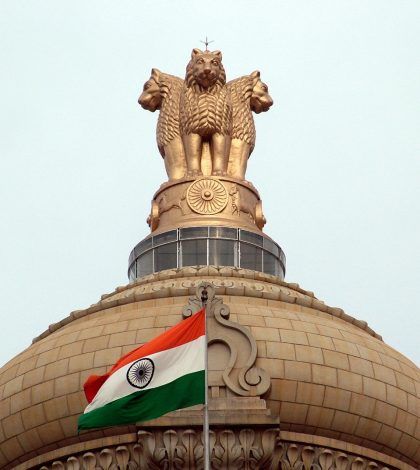India’s Regulatory Framework for Foreign Lawyers: Reciprocity Over Protectionism
India’s regulatory framework for foreign lawyers has come under global scrutiny following the Bar Council of India’s (BCI) 2024 rules that allow foreign legal professionals into India on a regulated, reciprocal basis. Contrary to criticism labelling the framework as protectionist, India’s legal approach aims to modernize its legal ecosystem while safeguarding domestic legal integrity.
Introduction
In May 2024, the BCI notified the “Rules for Registration and Regulation of Foreign Lawyers and Foreign Law Firms in India.” These rules seek to permit conditional entry of foreign lawyers, aligning with international legal trends. Although India has over 1.4 million lawyers, cross-border legal exposure is limited. According to the Global Legal Services Market Report (2023), international transactions are rising—making foreign collaboration necessary. Despite some criticism, India’s principle remains: allow only what Indian lawyers are allowed abroad—reciprocity, not protectionism.
Understanding the Regulatory Framework
BCI's Statutory Mandate and Constitutional Context
- The BCI is a statutory body under the Advocates Act, 1961—not a trade body.
- Legal practice in India falls under Entries 77 & 78 of the Union List, distinguishing it from trade-related services.
- The 2024 Supreme Court judgment in Bar of Indian Lawyers vs. D.K. Gandhi confirmed legal service as a contract of personal service.
- Legal services, unlike engineering or consultancy, are jurisdiction-bound and client-specific—unsuitable for liberalized trade agreements.
Key Provisions of the 2024 Rules
- Rules 3 & 4 permit registration for non-litigious matters like IPR, arbitration, and M&A.
- Rule 3(1) allows "fly-in, fly-out" visits of up to 60 days per year without registration.
- Reciprocity clause ensures only those foreign lawyers get access whose countries allow equivalent rights to Indian lawyers.
- India excluded legal services from the UK-India FTA to preserve regulatory sovereignty.
Client Confidentiality and Ethical Compliance
- Rule 4 mandates disclosure of work nature—not client details—ensuring confidentiality.
- Though some U.S. objections cite conflict with ABA rules, Indian rules seek transparency, not ethical breach.
- Rule 6 enables case-by-case assessments by BCI, offering regulatory flexibility.
- Case example: Lawyers Collective vs. Bar Council of India (2009) stressed the need for a well-defined regulatory scope.
Reciprocity Realities
- U.S. legal system lacks federal reciprocity; Indian lawyers must pass state-level Bar exams.
- Rule 4(h) certification faces hurdles due to decentralized U.S. licensing, but BCI provides flexibility.
- India follows a gradual, controlled model—unlike broader liberalization seen in the UK or Singapore.
Addressing the Criticisms
Claims of Protectionism
- India allows limited, regulated access—not a blanket ban.
- Withstood global pressure during FTAs, showing independent regulatory thought.
- The regulatory process has evolved over two decades with multiple committee reports.
- SC in Bar Council of India vs. A.K. Balaji (2018) allowed foreign lawyers advisory roles under "fly-in, fly-out."
Regulatory Necessity vs Procedural Barriers
- Registration ensures accountability—not prohibition.
- Framework provides ethical protection for clients and legal professionals.
- Reciprocity ensures fairness, given stricter barriers Indian lawyers face abroad.
- Example: Indian lawyers need LLMs, state exams, and years of supervision to practice in New York or California.
Trade Concerns
- Legal services aren’t mandatorily included in WTO's GATS regime.
- The framework still enables cross-border advisory roles in IP, M&A, and arbitration.
- Indian companies can still seek foreign legal advice via recognized structures.
Judicial and Consultative Support
- Backed by two decades of consultative reports and national studies.
- Legal precedents from Bombay HC and SC lay a foundation for balanced liberalization.
- Law Commission of India’s 266th Report (2017) supported foreign law firm entry under safeguards.
Way Forward & Strategic Reforms
Balancing Openness and Sovereignty
- Phase-wise liberalization to protect domestic legal professionals.
- Sign bilateral MoUs for legal reciprocity.
- Create BCI portals for streamlined foreign lawyer registration.
Strengthening Legal Infrastructure
- Promote joint ventures between Indian and foreign firms.
- Establish international arbitration hubs in metro cities.
- Encourage LLM exchanges through G2G agreements.
Building Global Legal Competence
- Include comparative law in law school curricula.
- Launch global fellowship programs under BCI guidance.
- Allow optional foreign law modules in Bar exams to facilitate outward mobility.
Improving Regulatory Clarity
- Clarify disclosure requirements to match international ethical standards.
- Update BCI rules regularly to reflect changes in tech and global law practices.
- Set up a BCI-Foreign Lawyer Cell for real-time issue resolution.
Conclusion
India’s regulatory framework for foreign lawyers reflects a principled stance of reciprocity rather than protectionism. It integrates global legal norms while preserving national legal sovereignty. As the world moves toward greater legal interdependence, India’s cautious and calculated liberalization ensures it remains globally relevant while safeguarding domestic legal standards.


